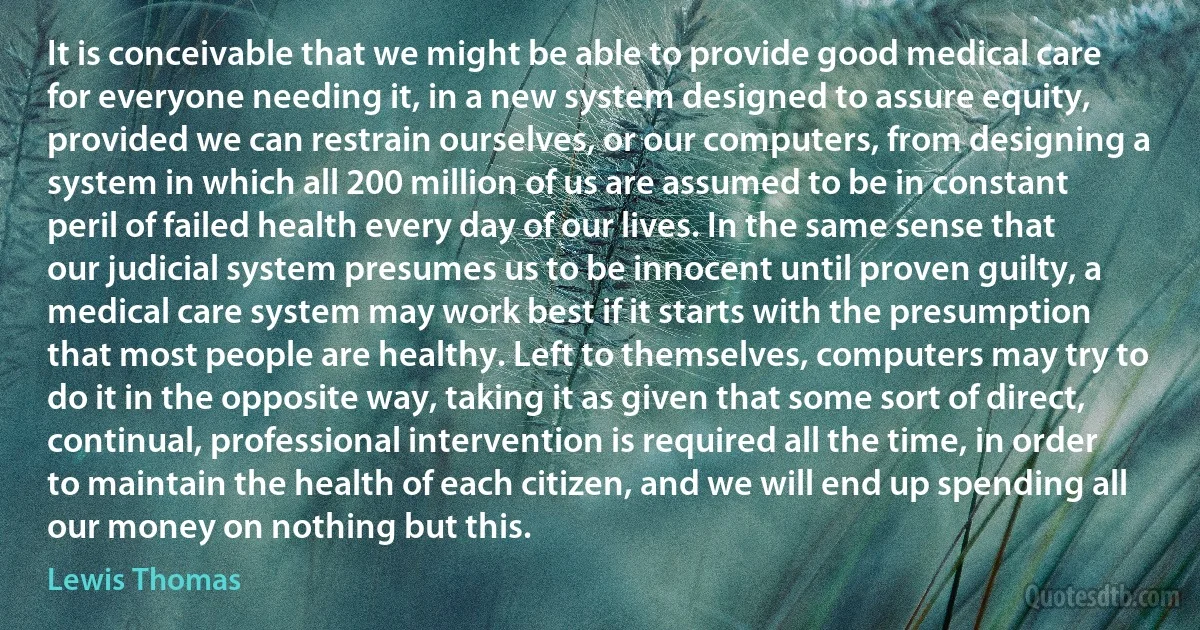
It is conceivable that we might be able to provide good medical care for everyone needing it, in a new system designed to assure equity, provided we can restrain ourselves, or our computers, from designing a system in which all 200 million of us are assumed to be in constant peril of failed health every day of our lives. In the same sense that our judicial system presumes us to be innocent until proven guilty, a medical care system may work best if it starts with the presumption that most people are healthy. Left to themselves, computers may try to do it in the opposite way, taking it as given that some sort of direct, continual, professional intervention is required all the time, in order to maintain the health of each citizen, and we will end up spending all our money on nothing but this.
Lewis ThomasRelated topics
able best care citizen constant day designing direct end equity everyone given good guilty health innocent intervention judicial left lives might medical million money needing nothing opposite order people peril presumption professional prove sense sort spending system taking time try way workRelated quotes
God thus includes the world; he is, in fact, the totality of world parts, which are indifferently causes and effects. Now AR [absolute perfection in some respects, relative perfection in all others] is equally far from either of these doctrines; thanks to its two-aspect view of God, it is able consistently to embrace all that is positive in either deism or pandeism. AR means that God is, in one aspect of himself, the integral totality of all ordinary causes and effects, but that in another aspect, his essence (which is A), he is conceivable in abstraction from any one or any group of particular, contingent beings (though not from the requirement and the power always to provide himself with some particulars or other, sufficient to constitute in their integrated totality the R aspect of himself at the given moment).

Charles Hartshorne
P. Bernays has pointed out on several occasions that, since the consistency of a system cannot be proved using means of proof weaker than those of the system itself, it is necessary to go beyond the framework of what is, in Hilbert's sense, finitary mathematics if one wants to prove the consistency of classical mathematics, or even that of classical number theory. Consequently, since finitary mathematics is defined as the mathematics in which evidence rests on what is intuitive, certain abstract notions are required for the proof of the consistency of number theory.... In the absence of a precise notion of what it means to be evident, either in the intuitive or in the abstract realm, we have no strict proof of Bernays' assertion; practically speaking, however, there can be no doubt that it is correct...

Paul Bernays
The whole of the laws which were required to be faithfully executed were being resisted and failing of execution in nearly one-third of the States. Must they be allowed to finally fail of execution, even had it been perfectly clear that by the use of the means necessary to their execution some single law, made in such extreme tenderness of the citizen's liberty that practically it relieves more of the guilty than of the innocent, should to a very limited extent be violated? To state the question more directly, Are all the laws but one to go unexecuted, and the Government itself go to pieces lest that one be violated? Even in such a case, would not the official oath be broken if the Government should be overthrown when it was believed that disregarding the single law would tend to preserve it?

Abraham Lincoln
I've always doubted that the socialists had a leg to stand on intellectually. They have improved their argument somehow, but once you begin to understand that prices are an instrument of communication and guidance which embody more information than we directly have, the whole idea that you can bring about the same order based on the division of labor by simple direction falls to the ground. Similarly, the idea [that] you can arrange for distributions of incomes which correspond to some conception of merit or need. If you need prices, including the prices of labor, to direct people to go where they are needed, you cannot have another distribution except the one from the market principle. I think that intellectually there is just nothing left of socialism.

Friedrich Hayek
I gave up on this stuff. I gave up on my species and ... I gave up on my countrymen. Because I think we squandered great gifts. I think humans were given great great gifts: walking upright, binocular vision, opposable thumb, large brain ... We grew. We had great gifts, and we gave it all up for both money and God ... We gave it all up to superstition, primitive superstition, primitive shit ... Invisible man in the sky, looking down, keeping track of what we do, make sure we don't do the wrong thing, if we do, he puts us in hell, where we burn forever. That kind of shit is very limiting for this brain we have. So we keep ourselves limited. And then we want a toy and a gizmo and gold and we want shiny things, and we want something to plug in that will make big big big things for us... And all that shit is nothing! It's nothing.

George Carlin
